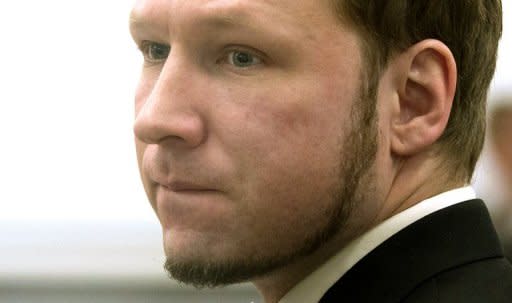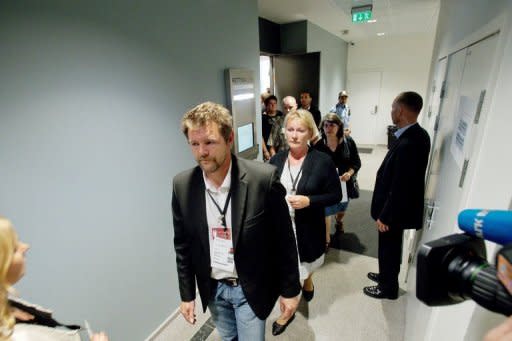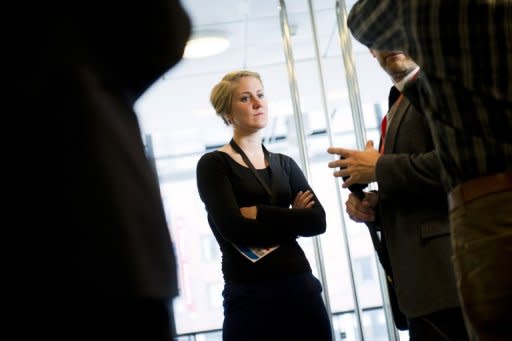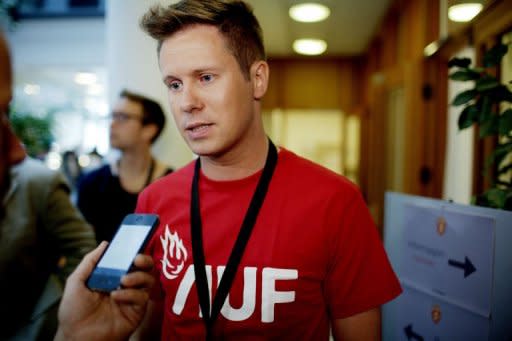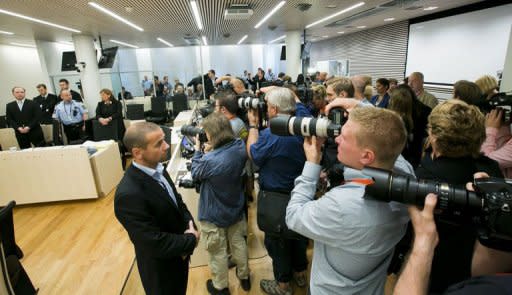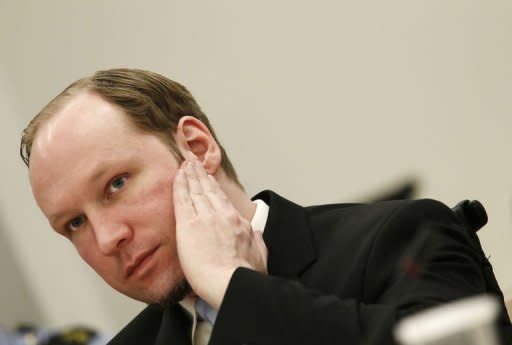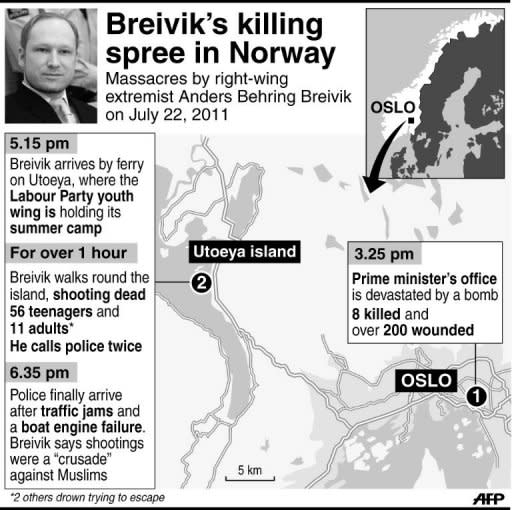Breivik trial: live report
The trial of Norwegian mass killer Anders Behring Breivik concluded on Friday, with his defence team arguing he was sane enough to be responsible for his actions and should be acquitted or jailed, not locked up in a psychiatric institution. The 33-year-old killer, in a final address to court, said he had "carried out a small barbarism to stop a greater barbarism" in the shape of what he perceived as a Muslim invasion of Europe, and should be seen as defending his country. But many in the court were reduced to tears by testimony from survivors of his twin massacres last July, which killed 77 people, and from those who lost family members in the gun and bomb attacks that left normally peaceful Norway deeply shocked. Mother Unni Espeland, whose teenage daughter Andrine was killed on the island of Utoeya, told the court of the series of calls and text messages from Andrine before she was killed. "Grieving for her is the most difficult job I have ever had to do," she said. Tonje Brenna, a young politician who was present at the island massacre, appeared to speak for many when she said: "We survivors of Utoeya... are sure of one thing when the judgement falls: we never want to see this murderer again." The ten-week trial concluded exactly 11 months after the killings. A verdict will be announced on August 24. Breivik could be sentenced to Norway's maximum penalty of 21 years in prison, which can be extended for as long as he is considered a danger to society, or he could be committed to closed psychiatric care. This Live Report is now ending. Read on for full details of today's hearing. 1305 GMT: That brings to an end the trial of Anders Behring Breivik, exactly 11 months after he massacred 77 people in Norway. In his last chance to address the court, the confessed killer demanded that he be acquitted on the grounds that he was acting in defence of "my ethnic group" against multiculturalism and a "Muslim invasion" of Norway. We will hear whether he has been sentenced to jail or psychiatric treatment on August 24. 1254 GMT: BREIVIK TRIAL ENDS, VERDICT SET FOR AUGUST 24: JUDGE 1253 GMT: BREIVIK DEMANDS ACQUITTAL, SAYS HIS ATTACKS WERE TO PROTECT HIS COUNTRY 1252 GMT: "The conflict will escalate in the years to come," says Breivik. The judges look straight ahead as he claims there is a conspiracy between journalists, those in power and academics. 1251 GMT: "The judges sitting here today can judge me as they wish," says Breivik, but he calls them to support his "principle of necessity" under which he "carried out a small barbarism to stop a greater barbarism". Breivik alleges that the next attack by militant nationalists in Europe could kill up to 40,000 people "in the worst case". He cites the example of an explosive device found on a truck this week inside a Swedish nuclear plant, which prompted the country to tighten security at its atomic power plants. 1248 GMT: Lawyers have called him a "child killer" but this is not true, claims Breivik, alleging his victims on Utoeya were over 18, the same age as Norwegian soldiers who have died in Afghanistan. In actual fact his youngest victim had just turned 14. 1244 GMT: "The media says that the majority of Muslims support democracy, but this is not true," says Breivik. He claims that most Muslims want a "caliphate" and "sharia", referring to strict interpretations of Islamic law. 1242 GMT: Breivik is now talking about his conception of indigenous population and the "ongoing ethnic destruction, also known as genocide or ethnic cleansing" that he believes is taking place. There is a "demographic war", Breivik believes, which is gradually allowing Muslims to become a majority. 1240 GMT: Norway has "disgust" for its own culture, claims Breivik -- for example, in choosing Iranian-born Tooji as its entry in the 2012 Eurovision Song Contest. Members of the public laugh out loud at this. 1235 GMT: Breivik believes Norway's Labour Party want to "culturally and ethnically transform" the country behind the smokescreen of its international obligations, he says. Breivik's own lawyer Geir Lippestad, who spoke at length this morning, is a member of the Labour Party. 1230 GMT: Breivik reads his notes. His lawyer Geir Lippestad looks distressed, says our reporter. He is now claiming the Norwegian Labour Party had links with the former Soviet Union. Although the party isn't communist, he says, it received funding from the Soviets ahead of World War II and had close ties with Soviet leadership. 1225 GMT: Breivik is critical of the Norwegian Labour Party, whose youth gathering he targeted with his shootings on Utoeya. He says they have physically and mentally harassed conservatives, while the press have withheld the truth on Labour's orders. Breivik is apparently claiming that some conservatives were sent to mental hospitals following their treatment by Labour. It's unclear if he is referring to anyone specific here. Norway's Conservatives were most recently in power from 2001 to 2005 as part of a ruling coalition. 1219 GMT: On the issue of criminal responsibility, Breivik says he underwent psychiatric evaluations by 37 people and 35 of those found no symptoms of mental illness. "It's pretty obvious" what the conclusion should be, he adds. Breivik now launches into an ideological tirade, lamenting what he says is a loss of values since World War II and damage to the traditional family from the sexual revolution. As an example of moral decay, he cites the TV show Sex and the City, in which "Samantha and Carrie make love with several hundred men", and calls for programmes like this to be censored. "The European model of democracy (...) does not work," Breivik adds. "We need a fundamental change of direction." 1216 GMT: A day before his twin attacks, says Breivik, "I thought: 'Tomorrow I will die'." He thought again of his impending death as he travelled the last 200 metres to the seat of Norway's government, where he planted his bomb, Breivik says. To motivate himself to go ahead with the attacks, he says, he asked himself: "Why will I die?" 1214 GMT: Anders Behring Breivik is now speaking. "We can all agree that 22/7 was a barbaric act," he says. 1210 GMT: VICTIMS' FAMILIES LEAVE OSLO COURTROOM AS BREIVIK MAKES FINAL REMARKS 1204 GMT: The court's session resumes. Unusually, police are standing between Breivik and the public attending court -- perhaps through fear that the tragic stories just told by survivors and family members might trigger a violent reaction against the mass killer. 1155 GMT: Applause from the public gallery for Lara Rashid, and the court adjourns until 1200 GMT. There are many hugs and tears among those in the public gallery, with journalists also emotional after hearing from these five people affected by Breivik's attacks. After the break, Breivik himself will speak. 1153 GMT: Since 22 July, says Lara Rashid, she has been afraid to go back to Oslo and afraid of the police as she was in Iraq. Breivik wore police uniform as he shot teenagers on Utoeya. "And the worst thing is that my sister is not here to comfort me," says Lara. "I don't want to live like this. I wish it had never happened." Her sister had been fighting for multiculturalism, she says, and was thus among those Breivik saw as his sworn enemies. She speaks of her pain at knowing her sister will not be there on her wedding day, to see her children, or for the confirmation of their younger brother. 1149 GMT: The next to speak is Iraqi-born Lara Rashid, who was on Utoeya with her older sister when she was killed in Breivik's shootings. She recalls her background amid conflict in Iraq, nightmares, and fears that the police had arrived and that her father -- an Iraqi Kurd who left as a refugee -- was once again a political prisoner. With her sister Bano, says Lara, "we shared everything -- our clothes, our secrets." Together, the two felt that they would never be lost. "The day she died, I died too," Lara tells the court. 1147 GMT: "For me, the question is not whether he is criminally responsible or not," says Espeland. "For me, the important thing is that he never comes out, that we never have to cross his path in the street." Applause greets the end of her testimony. 1145 GMT: Two of the judges are in tears as Unni Espeland speaks of the little episodes in life -- buying Converse trainers, eating chicken wings while watching television -- that she will no longer be able to share with her daughter. 1140 GMT: Unni Espeland recalls phone calls from her teenage daughter Andrine after the bombing in Oslo and again to tell her mother that there had been a shooting on Utoeya. A boy took the phone, says Espeland, and told her not to worry, he would take care of Andrine. Espeland received a last text message from her daughter at 6.35pm on the day of the massacres, saying a man dressed as a police officer was shooting young people on Utoeya. Andrine was one of the last to die in Breivik's shooting spree. "Grieving for her is the most difficult job I have ever had to do," Espeland says, to sounds of sobbing in the courtroom. 1136 GMT: Now speaking is Unni Espeland, whose daughter Andrine was killed on Utoeya island aged 16. 1135 GMT: More applause at the conclusion of young politician Tonje Brenna's speech, when she concludes that "everything will go well". 1130 GMT: Reading a prepared speech, youth leader Brenna recalls being "angry, sad and terribly afraid". She glances towards Breivik, who stares at her without flinching. "We survivors of Utoeya... are sure of one thing when the judgement falls: we never want to see this murderer again," she says. 1129 GMT: Brenna speaks in a strong voice, recalling her disbelief on the day of the attacks. When the gathering on Utoeya heard of the bombing in Oslo, the reaction was: "But there are no bombings in Norway," she says. When shooting began on Utoeya, says Brenna, she thought: "We are at war." 1128 GMT: Now taking the stand is Tonje Brenna, head of the ruling Labour Party's youth wing, who was on Utoeya island when Breivik began shooting teenagers dead. Brenna -- who has already testified during the trial -- pays tribute to the previous witness, Kirsti Loevlie, who works as a teacher, saying her students are lucky. 1124 GMT: There is applause in the courtroom after the testimony of bereaved mother Kirsti Loevlie -- a rare event during the trial, says our reporter Pierre-Henry Deshayes. Even prosecutor Inga Bejer Engh is red-eyed after hearing her account of losing her daughter Hanna in Breivik's bombing. 1122 GMT: Kirsti Loevlie says that she is confident that the court will make the right decision and Breivik will never regain his freedom. Breivik looks away as she says this. 1117 GMT: Speaking of Breivik's previous testimony at the trial, Loevlie says it was "horrible to listen to this man" and hear him classify her daughter as a "class B traitor". "Enough is enough," says Loevlie. "After this trial, we no longer want to hear about it." Loevlie is slightly comforted, she says, by the thought that her daughter was killed instantly, without seeing death coming -- a nightmare endured by those attacked on Utoeya island, who were approached by an armed Breivik. 1116 GMT: "I will not let this man scare me," says Kirsti Loevlie, whose daughter died in Breivik's bombing, as she explains why she chose to testify. Breivik remains impassive as she speaks. 1113 GMT: Kirsti Loevlie's voice trembles as she speaks of the pain of having to pack up her daughter's apartment forever, and living through Christmas without her. Many are in tears, both in the public gallery and among journalists, says our reporter Pierre-Henry Deshayes. 1112 GMT: Bombing victim Wilsgaard concludes by saying that she is "confident Breivik will be judged according to the rule of law". Next is Kirsti Loevlie, whose daughter Hanne was killed in the bombing on the day she was due to celebrate her 30th birthday with her family. Breivik seems more interested in his notes than in the testimony, however. 1110 GMT: Bombing victim Sissel Wilsgaard struggles with tears as she speaks of the trauma. Breivik, however, calmly makes notes as she speaks. He may be preparing his final statement, for which an hour has been allocated. Room 250 of Oslo's Central Court is packed with survivors and victims' relatives watching this final day of Breivik's trial. 1105 GMT: Wilsgaard, who was pictured covered with blood in the aftermath of the bombing, describes the wounds -- both visible and psychological -- inflicted on government employees by the blast. 1100 GMT: We will now hear from five representatives of survivors and those who lost loved ones in Breivik's attacks last July. First on the stand is Sissel Willsgaard, an employee at the Department of Justice who was wounded in the bombing of Oslo's government district. 1054 GMT: The court is back in session. Defence lawyer Vibeke Hein Baera -- who works with Geir Lippestad, who spoke at length before the break -- outlines the defence team's main points, not forgetting the request that Breivik be acquitted. 1015 GMT: On Twitter, many commentators are pointing out that Breivik's situation in court is the reverse of the normal position: the prosecution are arguing he is insane, while the defence say he is sane and should be jailed (if he is not acquitted). Others point out the contrast between Norway's maximum 21-year jail sentence and the 110 years handed to financier and cricket mogul Allen Stanford this month in a United States court for large-scale fraud. However, Norwegian law provides for a sentence to be extended beyond 21 years for as long as a convict is considered a danger to society. 0953 GMT: Stay with us for more from our reporters Pierre-Henry Deshayes and Nina Larson, and photographs from the courtroom by Daniel Sannum Lauten. Later today we are to hear from five of the survivors and the bereaved: Unni Espeland, Sissel Willsgaard, Lara Rashid, Tonje Brenna and Kirsti Lovlie. Later still the court is due to hear from Breivik himself. 0944 GMT: On the final day of Anders Behring Breivik's trial for the murders of 77 people in twin massacres in Norway last July, we've heard the defence make the case for him being considered sane. If not acquitted he should be jailed, not sent to psychiatric care, argued defence lawyer Geir Lippestad, requesting "the mildest possible punishment". Breivik is not mad but a "terrorist", he said, with a "human right" to be held responsible for his own actions. Later we'll hear the prosecution's response to the defence case, plus statements from representatives of those affected by the killings, and Breivik himself. A media report in Norway said members of a group representing victims and families would leave the court in protest when Breivik speaks. 0940: GMT A break now until 1045 GMT. 0935: GMT: BREIVIK DEFENCE REJECTS PSYCHIATRIC CARE, URGES "MILDEST POSSIBLE PENALTY" 0930 GMT: Lippestad points out that his client, while he understands he will be punished for his actions, has evoked the "principle of necessity" for his actions, because he claims to have acted to defend Norway. If the court were to agree to this, it would need to acquit Breivik -- not seen as a realistic possibility. 0928 GMT: Many psychiatrists and psychologists, including those who have observed Breivik in custody, have said he is not showing signs of a condition such as psychosis, says Lippestad. 0919 GMT: Lippestad is determined to demolish every aspect of the initial psychiatric report which found Breivik to be a paranoid schizophrenic. Breivik's neologisms, seen in that report as symptom of a mental health condition, were actually used among extremists online, he says. As for the report's methods, he is critical of the psychiatrists' decision to meet with Breivik as a group rather than separately, their lack of audio recordings and their delay in note-taking until after each meeting. 0910 GMT: Breivik's behaviour changed drastically in 2006, when he returned to live with his mother aged 27, living a reclusive life and devoting himself to video games for an entire year. Again, Lippestad says that this was not a sign of mental illness. Rather, it was a strategic choice for Breivik to work on his manifesto and prepare for his massacres, he argues. 0905 GMT: On the assumption of a "right to kill", which one group of psychiatrists considered to be a sign of madness, Lippestad says his client knew that killing was "wrong". "But that's what terrorists do," he says. "The end justifies the means. That is classic terrorist thinking." 0900 GMT: Breivik might have claimed he was part of a "Knights Templar" group in order to spread fear, says his lawyer. "It would not have been very frightening to say that he was alone, and that no one was out there to continue his work. It is a terrorist's wish to say there is something grandiose behind him," Lippestad says. 0856 GMT: Continuing with his demolition of an initial psychiatric report into Breivik which found him to be suffering from paranoid schizophrenia (contradicted by a later report), Geir Lippestad moves on to the idea that Breivik was experiencing delusions of grandeur. The report cited membership in an "organisation that does not exist" -- the Knights Templar, which Breivik has argued is fighting against Islam in Europe. He suggests the group might actually exist in some form, saying that Breivik called it a modest organisation in which he was a mere "foot soldier". The existence of the Knights Templar is "not an impossibility even if the police haven't traced it", he said: the police don't necessarily get wind of every group of ten people. 0848 GMT: "Is he (Breivik) the only person in the world to think we are at the beginning of a war" of demographics, questions Lippestad. There are a number of right-wing extremists who talk about "a war" with Muslims and Islam, he says. This does not mean they actually have the delusion that there is a war going on with tanks and soldiers, adds the lawyer. 0840 GMT: Lippestad is now seeking to further dismantle the argument that Breivik is insane because he suffers from delusions. Delusions are defined as "culturally inappropriate", he says. But Breivik sees himself as a terrorist in a modern context, says Lippestad -- he's not casting himself as Jesus, for example. 0839 GMT: If you're joining us now, this is the final day of the Norwegian mass killer Anders Behring Breivik's trial for the murders of 77 people last July. On the trial's final day -- ahead of a verdict in July or August -- the defence is summing up. This will be followed by more lawyers' reactions, then statements from representatives of those affected by the killings and Breivik himself. Defence lawyer Geir Lippestad was obliged to request Breivik's acquittal, given the defendant's choice to plead guilty despite also confessing to the killings. But he has so far devoted most of his arguments to making the case for Breivik being criminally responsible and therefore eligible for a jail sentence instead of psychiatric care. This was expected since there is no expectation of Breivik being acquitted. 0835 GMT: The court is back in session, with defence lawyer Geir Lippestad saying he thinks he will have finished his statement by 1000 GMT. 0830 GMT: The Norwegian public broadcaster NRK is reporting that members of the support group for survivors of Breivik's attacks and for families of his victims are planning to march out of the courtroom in protest when he begins talking this afternoon, according to our reporter Nina Larson. 0829 GMT: Our reporter Pierre-Henry Deshayes says there is a "forest of cameras" outside the courtroom. Bjorn Ihler, a young survivor of the massacre on Utoeya island that killed 69 people, tells the press: "It is important that the political aspects are highlighted... I don't know if that is enough to determine whether he is criminally responsible, but in any case he brought up political motivations, a political ideology that is shared by far too many people, and that political ideology should be taken seriously, exposed and debated." 0825 GMT: A verdict in the case is expected on either July 20 or August 24, with judges ruling on whether or not Breivik is criminally sane. 0820 GMT: A break now until 0830 GMT, after defence lawyer Geir Lippestad set out a series of arguments for Breivik being found criminally responsible and jailed. Breivik is now in an odd position in which the prosecution favours psychiatric care, but his defence is arguing for him to be sent to prison. Breivik himself favours prison and has said that being locked up in a psychiatric ward would be "a fate worse than death". His reasoning is that he wants his political views to be taken seriously, not dismissed as the ravings of a lunatic. 0818 GMT: "It is not violence which lies behind his acts, but political extremism," says lawyer Geir Lippestad. "If the court considers it is indeed his extremist views that are at the root of his actions, we can ignore the first psychiatric report," he concludes. That report argued, on the basis of Breivik's "delusions", that he suffered from paranoid schizophrenia. 0816 GMT: Even as Breivik was on his shooting spree, he picked targets he deemed political, says Lippestad: for example, he spared a ferry captain and a 10-year-old. 0815 GMT: In his "manifesto" Breivik said that violence was not an end in itself but a means to an end, namely that "Europe... must be freed from Muslims", notes his lawyer. He says Breivik has repeatedly called the attacks of 22 July last year "fireworks" aiming to draw attention to the manifesto. 0812 GMT: "Why would someone solely motivated by violence devote so many years of his life to this... without a political project?" asks Lippestad. 0808 GMT: We've updated this story with photographs from this morning, taken by our photographer Daniel Sannum Lauten. 0804 GMT: Breivik's inspirations, such as a Norwegian blogger known as "Fjordman", were extremists but not advocates of violence, says Breivik's lawyer. The same is true of the 8,000 people to whom he sent his rambling 1,500-page manifesto, argues lawyer Geir Lippestad. If you're joining us now, all this is Breivik's defence lawyer, in his summing-up, arguing against the case for the Norwegian mass killer being mentally ill and in favour of him being criminally responsible, and thus deserving of a jail sentence. 0800 GMT: Lippestad says Breivik's actions were "based on extremism", not psychotic, violence-prone delusions. 0755 GMT: On 22 July 2011 Breivik unleashed "a hell of violence", says his lawyer. But afterwards, he has showed no further signs of violent tendencies -- not in prison, under psychiatric observation or during the trial. All of this, says Lippestad, detracts from the argument that Breivik has some kind of innate "taste for violence". 0752 GMT: Lippestad argues that Breivik's choices of targets were clearly political. The lawyer points out that if he had simply wanted to kill as many people as quickly as possible, he could have bombed a nearby, crowded shopping centre or pedestrian shopping street, instead of a near-empty government building on a Friday afternoon in the middle of the main vacation period. The bomb attack, which came before Breivik's mass shooting, killed eight people and wounded almost 200. 0752 GMT: Nothing in Breivik's previous record, which includes minor offences such as riding a motocycle while drunk and graffiti, shows signs of violence, says Lippestad. 0746 GMT: Defence lawyer Lippestad continues with his argument that Breivik didn't show a "taste for violence" before his massacres -- a trait previously cited as a sign of paranoid schizophrenia. Breivik was a video game enthusiast when he was younger but the games he played weren't especially violent ones, he says. He particularly liked World of Warcraft, which is suitable for players aged 12 and up, said Lippestad. The game was scrutinised earlier this month at the trial, but Breivik insisted that "'World of Warcraft' has nothing to do with July 22" -- the date of his mass killings. Breivik previously said he took a year off in 2006 to dedicate himself completely to playing the multi-player game set in a fantasy medieval world, and that he had spent up to 17 hours a day at it. 0744 GMT: Lippestad says that if we look at Breivik's childhood, "there is no evidence that he was violent" -- and similarly he didn't show violent traits during his teenage years. In difficult situations, the young Breivik instead turned to rhetoric, says his lawyer. 0742 GMT: Defence lawyer Lippestad also rejects the idea that Breivik was motivated by a "taste for violence" rather than ideology, as concluded in that first psychiatric report. 0737 GMT: Lippestad cites an initial court-ordered assessment of Breivik's mental health, which found him to be suffering from paranoid schizophrenia (a second assessment sharply contradicted that). That assessment described some of Breivik's ideas as "delusions". Yesterday, his belief in a "Knights Templar" network of militant nationalists was cited as one of these delusions. But Lippestad says that the medico-legal definition of a "delusion" says that it must be totally impossible -- for instance, to quote an example heard earlier in the trial, believing that one is communicating with Martians. That wasn't the case with Breivik's ideas, argues Lippestad. 0735 GMT: We've added on this page our graphic setting out the details of Breivik's massacres last year. 0734 GMT: Lippestad says he will dedicate the rest of his closing arguments to "what we think is the most important evidence that the accused is criminally sane". 0732 GMT: "To impose a diagnosis to explain his behaviour would deprive him of a fundamental human right -- the right to bear responsibilility for his own actions," Lippestad says of Breivik. 0727 GMT: Lippestad quotes one expert as saying: "It is just as bad to treat a healthy individual (in a psychiatric ward) as to not treat someone who is ill." This is building up to his argument that his client should be found sane and sent to prison. It's an interesting contrast with remarks by prosecutor Svein Holden yesterday. He said it was worse to sentence someone who is psychotic to prison than to send someone who is not psychotic to psychiatric care. 0725 GMT: "Forensic psychiatry is not an absolute science," Lippestad says, noting that this leaves the court some room for interpretation. 0724 GMT: Below is one of our photographs of defence lawyer Geir Lippestad, who is speaking now -- taken as he spoke to journalists last month. 0720 GMT: Our reporter Pierre-Henry Deshayes reports total silence in the courtroom as Lippestad speaks. Only his voice and the sounds of journalists typing can be heard. Breivik himself is reading papers and taking notes, as always using a flexible "safe pen" -- which cannot be used as a weapon -- and yellow post-it notes. 0718 GMT: Defence lawyer Lippestad is reviewing case law on similar cases where the question of criminal responsibility was central. 0713 GMT: As we mentioned below, the defence lawyers are formally obliged to request Breivik's acquittal since he has opted to plead not guilty. They are expected to evoke the "principle of necessity", of which Breivik spoke at the start of his trial, under which an individual is -- under certain circumstances -- held to have been compelled to kill others, even if they have not harmed him directly. But as the defence lawyers have already said, there's no expectation at all that this will succeed so they will focus on the issue of mental health, holding Breivik to be criminally sane. Breivik said he acted to protect Norway against multiculturalism and "Muslim invasion". 0710 GMT: Lippestad says he shares the view expressed yesterday by prosecutor Inga Bejer Engh, who said the attacks of 22 July were so horrific it was difficult to comprehend their reality. "But unfortunately, this is the reality," Lippestad says. 0706 GMT: Defence lawyer Geir Lippestad begins closing arguments, which are being broadcast and are expected to last about three hours. Judge Wenche Arntzen said the court would not allow broadcasting of Anders Behring Breivik's final comments in court later, nor of those of the family members of victims and survivors who are to make statements, our reporter Nina Larson says. 0705 GMT: The judges arrive and the hearing begins. Breivik does not perform a far-right salute as he has done in the past, and did yesterday as the prosecution summed up. 0703 GMT: Prosecutor Svein Holden told public broadcaster NRK as he entered the courtroom that he thinks "it will be interesting to hear the defence's closing arguments" and that he was looking forward to seeing the trial come to an end. The last day of the trial comes exactly 11 months after the July 22 attacks. Five representatives of the families and survivors will be permitted to make statements at the end of the trial day today. 0659 GMT: Breivik himself arrives, handcuffed, in a black shirt, blue tie and white shirt. Prosecutor Svein Holden also arrives and both shake hands with Breivik's lawyer Geir Lippestad, who will be speaking this morning, as if to wish him luck. 0657 GMT: Both of Breivik's lawyers, Geir Lippestad and Vibeke Hein Baera, are now in place in the courtroom. Prosecutor Inga Bejer Engh is also present so we are just awaiting Breivik himself and the other prosecutor, Svein Holden. 0652 GMT: Our reporter Pierre-Henry Deshayes is at the court and has spoken to one of Breivik's lawyers, Vibeke Hein Baera, who said of the formal request for Breivik to be acquitted: "He knows it is just a technical request that is miles from reality." The defence case today will therefore focus on arguing he is criminally sane and should face jail, which is Breivik's own strong preference over psychiatric care. WELCOME TO AFP'S LIVE REPORT on the final day of the trial of Anders Behring Breivik over the killing of 77 people in twin attacks in Norway last July, with the defence set to sum up. During the 10-week trial, Breivik, 33, described his massacre as a "preventive" attack to defend "ethnic Norwegians" and stressed he would not hesitate to do it again. He said spending his life in prison or dying for his people would be "the biggest honour". If found sane, he risks a 21-year jail term, which could then be extended indefinitely if he is still considered a threat to society. If found insane he could be sentenced to closed psychiatric care, possibly for life. Proceedings today begin at 0700 GMT, with Breivik's main defence lawyer Geir Lippestad to set out his closing arguments at the Oslo district court. He has admitted to the media that he thinks his client's chances of acquittal are non-existent -- but he must still formally make the request since Breivik, who subscribes to a far-right Islamophobic ideology, has pleaded not guilty. Despite the plea, Breivik has confessed to the attacks which prosecutors yesterday called a "national trauma". The youngest of the victims, many of whom were teenagers, had just celebrated her 14th birthday.

